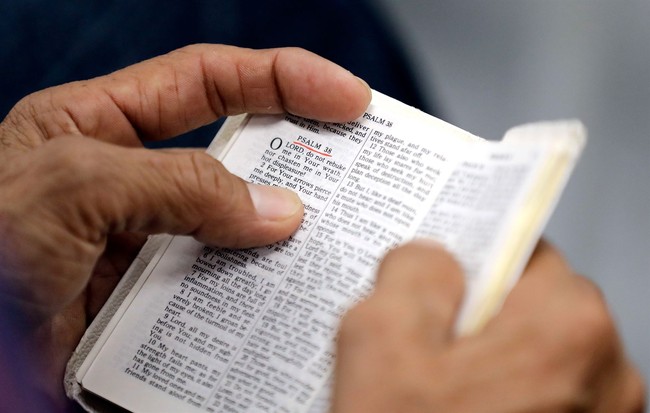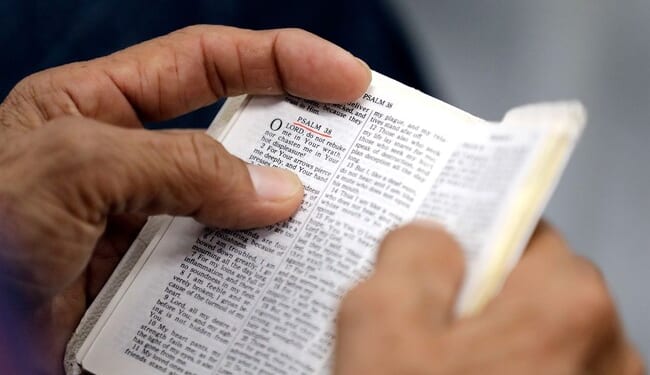
A couple of months ago, I stopped by a fast food place on my way home from church to grab lunch. As I was walking across the parking lot, a large family of two grandparents and six grandkids walked in. The wife was in front of me in line as the husband wrangled the grandchildren and sat them down at tables.
The way the family was dressed, I could tell that they had just come from church, too. There were tell-tale signs that they belonged to a church with a particular style of worship and a specific way of dressing outside of church. But they didn’t act like it in the restaurant.
Grandpa was visibly losing patience with the grandkids, which is totally understandable, but the way he snapped at the little ones had others staring at him. His wife was curt and rude to the employee who took her order. When another employee brought out trays of food and asked the husband if it was their food, he grumbled, “That’s not ours. We have more food than that.”
I try not to judge people, but I couldn’t help but cast aspersions on them. I’m not saying these people are abject hypocrites, but I couldn’t help but imagine that their behavior in the restaurant was a one-eighty from how they acted at church. Less than an hour before their time in the restaurant, they were most likely praising the Lord, speaking pleasantly to their church family, and smiling gladly. In the restaurant, they were rude, curt, and sour.
I remembered the incident when I read an article that the late R.C. Sproul wrote a few years ago. In it, he discusses how often Christians confuse the behaviors that believers show toward each other with genuine faith.
Sproul tells the story of how he discovered “spiritual platitudes” shortly after he became a Christian and began to sprinkle them into his daily routine.
Soon, however, I found that there was more to the Christian life than daily devotions and sanctified words. I realized that God wanted more. He wanted me to grow in my faith and obedience, to go beyond milk to the meat. I also discovered that Christian jargon was an almost meaningless form of communication, both to non-Christians and Christians alike. I found myself more interested in echoing a subculture’s lingo than in finding true godliness.
My error was this: I was confusing spirituality with righteousness.
Oof. I can think of times when I’ve done that. I bet you can, too.
Related: Sunday Thoughts: Why Prayer Is Powerful
Sometimes we can find ourselves caught up in the “trappings” of the Christian life: praying a perfunctory blessing before a meal, singing worship songs in our car without thinking about what we’re singing, telling someone “I’ll pray for you” without following through.
Or maybe we think that our spiritual disciplines and habits automatically equal righteousness for us. “I pray,” we may say, or “I read my Bible,” or “I go to church.” But we’re not necessarily pursuing righteousness in our lives as we go through those motions.
In Jesus’ day, the Pharisees were the masters of falling back on their disciplines to get by. They even added regulations to God’s law and expected their followers to obey them. Jesus had some choice words for them:
While Jesus was speaking, a Pharisee asked him to dine with him, so he went in and reclined at table. The Pharisee was astonished to see that he did not first wash before dinner. And the Lord said to him, “Now you Pharisees cleanse the outside of the cup and of the dish, but inside you are full of greed and wickedness. You fools! Did not he who made the outside make the inside also? But give as alms those things that are within, and behold, everything is clean for you. “But woe to you Pharisees! For you tithe mint and rue and every herb, and neglect justice and the love of God. These you ought to have done, without neglecting the others. Woe to you Pharisees! For you love the best seat in the synagogues and greetings in the marketplaces. Woe to you! For you are like unmarked graves, and people walk over them without knowing it.”
Luke 11:37:44 (ESV)
He also told a parable about what an overreliance on keeping the rules — combined with arrogance — looks like:
He also told this parable to some who trusted in themselves that they were righteous, and treated others with contempt: “Two men went up into the temple to pray, one a Pharisee and the other a tax collector. The Pharisee, standing by himself, prayed thus: ‘God, I thank you that I am not like other men, extortioners, unjust, adulterers, or even like this tax collector. I fast twice a week; I give tithes of all that I get.’ But the tax collector, standing far off, would not even lift up his eyes to heaven, but beat his breast, saying, ‘God, be merciful to me, a sinner!’ I tell you, this man went down to his house justified, rather than the other. For everyone who exalts himself will be humbled, but the one who humbles himself will be exalted.”
Luke 18:9-14 (ESV)
The Apostle Paul warned his charge Timothy that people in the last days would be guilty of “having the appearance of godliness, but denying its power” (2 Timothy 3:5, ESV). Charles Spurgeon lamented people who go through the motions without righteousness.
Related: Sunday Thoughts: ‘The Bible Is Good Like That’
“Where there is not the life of God in the soul, neither holiness nor godliness follows upon the ordinances; and thus we may have around us baptized worldlings, and men who go from the table of the Lord to drink the cup of devils,” he preached. “It is sad that it should be so.”
I pray that none of us falls into the trap of confusing our spiritual disciplines and habits with righteousness that comes from the heart. Instead, may our actions be an overflow of our love for God and desire to live for Him.

